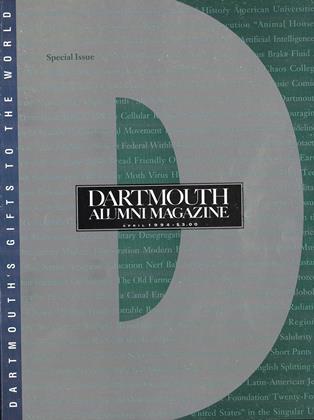Small Fry
While studying a genus of shrimp, Dartmouth undergraduate C. Everett Koop '37 discovered a new species and named it Eubranchipus Koopii. Despite this early promise, Koop chose to forego a teaching assistantship at Dartmouth's zoology department and instead enrolled in medical school.
Professor Holmes
In 1837 the Dartmouth Medical School created a physiology department and in 1939 hired its first professor of anatomy and physiology: Oliver Wendell Holmes. His dissection of a child's head was still in the possession of the medical school when this magazine last checked back in 1956. Holmes left Dartmouth for Harvard in 1850 and moonlighted as a writer.
First in War
Charles Lee Douglass 1862 was the nation's first undergraduate to join the Union Army when he was mustered into the First New Hampshire Regiment on May 1, 1861, at the age of 18. Eventually 653 Dartmouth students fought for the North, 44 for the South.
All Uphill
In 1913 a group of Dartmouth students, led by Outing Club founder Fred Harris '11, became the first to reach the summit of Mt. Washington on skis. They did it without poles.
Near Miss: The Nicaraguan Canal
In 1879, Dartmouth trustee Hiram Hitchcock became the head of the Nicaragua Canal Association. A water-way across Nicaragua seemed the most logical site to most Americans at the time. Had he invested in Panama, Dartmouth might have a bigger endowment today.
Lincoln's Doctor
In August 1835, a young surveyor named Abraham Lincoln was found by his friend John Allen 1828 in a state of malarial delirium. Allen, who was a medical doctor, supervised Lincoln's convalescence and within a year the patient won election to the Illinois state assembly.
Lincoln's Kingmaker
Historians say the influence of Amos Tuck 1835 made Abraham Lincoln the Republicans' Presidential nominee at its first convention, in Washington, D.C., in 1856. Tuck is also credited with naming the party.
Frost's Last Words
The last public address by Robert Frost 1896 was delivered at the newly opened Hopkins Center on November 26, 1962.
Webster's Eulogy
Rufus Choate 1819 delivered Webster's eulogy in Hanover on July 27, 1853. The tide: "Discourse Commemorative of Daniel Webster." One sentence of the speech contained 1,200 words and took ten minutes to recite possibly the longest sentence ever uttered by human lips before a large audience. A more memorable phrasing, allegedly first spoken by Webster, was first made public in Choate's speech: "It is, sir, as I have said, a small college..."
Shrimpman Koop
Dissector Holmes
Volunteer Douglass
Chubber Harris
Canalman Hitchcock
Physician Allen
Patient Lincoln
Kingmaker Tock
Dedicator Frost
orator Choate
 View Full Issue
View Full Issue
More From This Issue
-
 Cover Story
Cover StoryROSTER OF DARTMOUTH'S GIFTS TO THE WORLD
April 1994 -
 Article
ArticleThe Greatest Books by Dartmouth Authors
April 1994 -
 Class Notes
Class Notes1993
April 1994 By Christopher K. Onken, -
 Class Notes
Class Notes1981
April 1994 By Karen McKeel Calby, -
 Class Notes
Class Notes1989
April 1994 By Dan Parish, -
 Class Notes
Class Notes1983
April 1994 By Deborah Michel Rosch.
Article
-
 Article
ArticleHerewith the time of publication of the alumni
October, 1908 -
 Article
ArticleSTATE TEACHERS' ASSOCIATION
November, 1916 -
 Article
ArticleFRATERNITIES HOME AGAIN
December 1918 -
 Article
ArticleDo You Know About — The Moosilauke Ravine Lodge?
July 1956 -
 Article
ArticleBasketball
January 1955 By Cliff Jordan '45 -
 Article
ArticleJUNIOR SKI SCHOOL
April 1936 By H.T.A. Richmond '38

